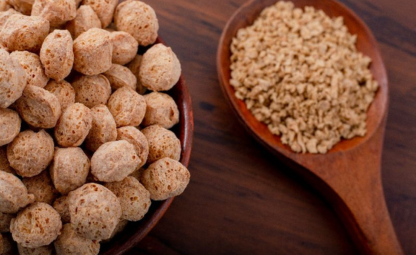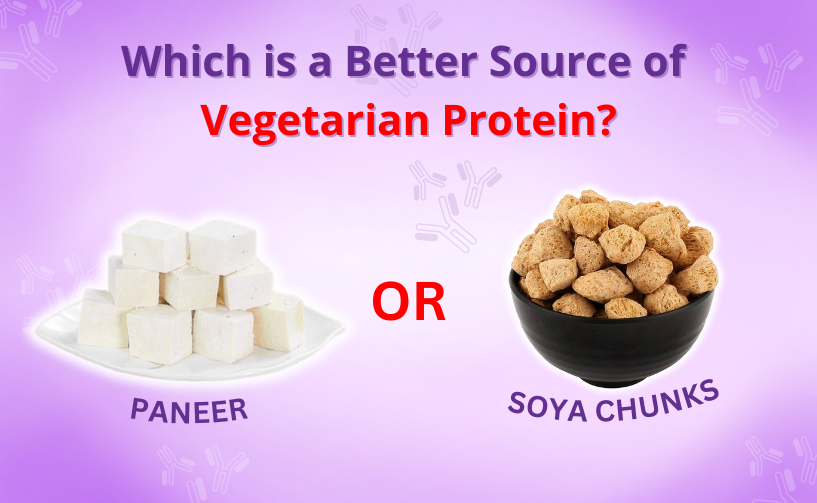When it comes to vegetarian protein sources, two contenders often take centre stage – paneer and soya chunks. While soya is commonly considered a calorie-light substitute for paneer, there's more to this protein-packed showdown than meets the eye.
The Calorie Conundrum:
Surprisingly, 100 grams of soya has more calories than 100 grams of paneer! Per 100 grams, soya chunks offer 345 calories, 33 grams of carbs, 0.5 grams of fat, and a substantial 52 grams of protein. The catch, however, lies in the serving size. Understanding the quantity you consume is crucial. A single bowl of soya sabzi, containing about 15 grams of soya chunks, amounts to approximately 52 calories – significantly less than you might expect.
Protein Prowess:
But here's the twist: while soya might be light on calories, it also means that in one serving, there's only around 7 grams of protein – significantly less than the protein-packed punch of paneer. A typical paneer sabzi serving, at 100 grams, delivers a whopping 20 grams of protein, even though with a higher calorie count (300 calories). So, the choice ultimately boils down to what you're optimising for – muscle building or weight loss?

The Calorie Conundrum:
Surprisingly, 100 grams of soya has more calories than 100 grams of paneer! The catch, however, lies in the serving size. Understanding the quantity you consume is crucial. A single bowl of soya sabzi, containing about 15 grams of soya chunks, amounts to approximately 52 calories – significantly less than you might expect.
Protein Prowess:
When deciding between soya and paneer, it's essential to consider what you're looking to achieve. While soya is often considered a lighter option due to its low-calorie count, it's also lower in protein compared to paneer. A single serving of soya only contains about 7 grams of protein, which is relatively less than what you get from paneer. On the other hand, paneer is a high-protein food, with 100 grams of paneer sabzi delivering a massive 20 grams of protein. Although, it's worth noting that paneer also has a higher calorie count - 300 calories per serving - which may not be ideal for those looking to lose weight.
So, paneer would be the better option if your goal is to build muscle due to its high protein content. However, if you're trying to cut down on calories and lose weight, soya could be a better choice for you. Ultimately, it all comes down to your personal preferences and fitness goals.
Choosing the Best Vegetarian Protein Source:
If your primary fitness goal is to build muscle or you're looking to increase your protein intake without being overly concerned about calories, paneer, also known as Indian cottage cheese, is an excellent option for you. Paneer is low in carbs and high in protein, making it an ideal choice for those who want to add muscle mass without worrying about gaining fat.
On the other hand, if your goal is to lose weight and maintain satiety with minimal calorie intake, soya chunks, also known as soy nuggets, are a fantastic option. Soya chunks are made from defatted soy flour and contain almost zero fat while providing an ample amount of protein. They are also a good source of dietary fibre, which helps to keep you feeling fuller for longer periods.
In summary, if you are looking to bulk up and increase your protein intake, paneer is an excellent choice, while soya chunks are an ideal option for those who want to lose weight and maintain satiety with minimal calorie intake.
Nutritional Bounty of Soya:
Soya is a legume that has been a staple food in many parts of the world for thousands of years. It is an incredibly versatile plant-based food that provides a range of essential nutrients. Apart from being a good source of high-quality protein, soya also contains other vital nutrients such as vitamins B, fibre, potassium, magnesium, and more.
Soya is a high-quality protein source because it provides a complete amino acid profile, including all nine essential amino acids. This is particularly beneficial for vegans and vegetarians who may struggle to get enough of these essential amino acids from other plant-based sources. The amino acids found in soya are also easily digestible, making it an excellent option for people with digestive issues.

In addition, soya has been linked to numerous health benefits, including a reduced risk of heart disease and certain cancers. It has also been shown to help improve bone health, reduce menopausal symptoms, and support healthy weight management.
Overall, soya is a nutritious and versatile food that can be incorporated into a range of dishes. Whether you are a vegan, vegetarian, or simply looking for a healthy protein source, soya chunks are an excellent choice.
Dispelling the Soy Myth:
There has been a lot of talk about the presence of estrogen in soy due to its high concentration of isoflavones, which are a type of plant-based estrogen known as phytoestrogen. There's been much chatter about the estrogen content in soya, primarily due to its concentration of isoflavones, a type of plant estrogen (phytoestrogen). However, these isoflavones have weaker effects than human estrogen and won't make you more feminine. So, rest assured, incorporating soya into your diet won't compromise your masculinity!
Alternative Protein Sources:
If you are looking for alternative sources of protein, you might want to consider whey protein. This type of protein is often misinterpreted as an unnatural source, but it is actually derived from milk. Whey protein is an excellent addition to your diet, particularly if you are aiming to build muscle mass. Including whey protein in your meals can provide you with the necessary amino acids and nutrients your body needs to support your fitness goals.






